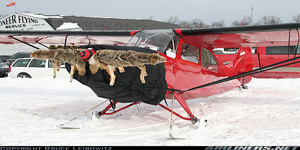This is veering into interesting territory... ;D
Just from going through five CFIs on my own journey to the PPASEL, I learned that it's tougher to make any changes once a pilot "knows a little". I didn't have any obvious bad habits, but every instructor is a little different in his or her approach, so a CFI who inherits a student is going to have to deal with that as well as just teaching the syllabus. The review flights were often as frustrating for the instructors as they were for me.
My subsequent flight reviews after getting my ticket indicated this as well: although it's not really a lesson, a BFR always has the potential for the pilot to learn something new, even a new angle on some thing he already practices.
Sometimes pilots develop bad habits on their own, too... another thing a reviewing instructor needs to look out for.
My last BFR was pretty lightweight, being bundled in with a tailwheel checkout, but being an oooold hand, Bob was studying me very closely, looking for bad habits. His debriefs focused quite a bit on what he liked or didn't like about my basic airmananship, even after the BFR itself was a done deal. I'm happy to report that his comments were mostly positive.

We talked about flying taildraggers a bit too, but that was more a matter of practice than theory, so he didn't have a whole lot to say about it during the eight hours or so of dual after he signed me off for the BFR. ;D
My point? Hmmm... yes, there's a point here... um... oh, yes- as relates to the "we're all counting on you" airliner scenario, I think it's hard to say who would do best: there might be a passenger who's a retired ATP with thousands of hours flying the line, but is so set in his ways he can't get up to speed with the airplane's systems (especially without a FO to do all the work), and he might also not willingly obey whoever's helping from the ground (who had better be a line instructor in type, or things will get ugly). This could create some problems. Consider how much can go wrong when a seasoned PIC makes a bad assumption or cuts a corner on even a normal flight... put the same sort of pilot in the hot seat during an "incapacitated crew" emergency in an unfamiliar flight deck and the potential for disaster increases.
On the other end of the spectrum is the kid with zero real flight time, but say, 300 hours flying that same type in the sim. If I were the line instructor on the ground, I don't think I'd feel either one of them had a better chance of success than the other.
A really good scenario would be an ATP in the left seat and the "sim kid" in the right dealing with the checklists... kind of like any first-time flight with a captain new to the type and a newly-minted FO.


 ...!
...! ...!
...! ...!
...!



 People Eating Tasty Animals.
People Eating Tasty Animals.





 ...!
...!